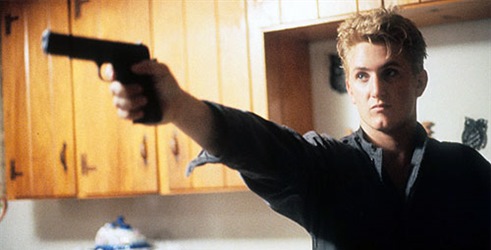

A Look Back At Sean Penn and Christopher Walken In 'At Close Range' Just In Time For Father's Day
By Brian Richards | Film | June 20, 2021 |
By Brian Richards | Film | June 20, 2021 |

From the late 1960s until 1978, Bruce Johnston, Sr. was a thief who ran an entire crew of fellow thieves known as the Johnston Gang. Whether it was cash, drugs, farming equipment, sporting goods, or antiquities, the Johnston Gang (which operated in the Chester County and Lancaster County sections of Pennsylvania, and sometimes in Delaware and Maryland) would take it all and use their vast criminal connections to make it all disappear while making themselves rich. When it became clear that the FBI and the police were investigating these robberies and getting closer to finding them, the Johnston Gang began killing anyone and everyone who could be considered a potential witness against them, including Bruce Sr.’s stepson, James “Jimmy” Johnston, and Robin Miller, a 15-year-old girl who was in a relationship with Bruce Sr.’s son, Bruce Johnston, Jr. (While his son was in jail on a burglary conviction, Bruce Sr. sexually assaulted Robin while she was intoxicated, which Bruce Jr. became aware of after Robin wrote him a letter to explain what happened)
Bruce Jr. was also targeted by the Johnston Gang, and was shot numerous times alongside Robin in front of her house. Robin didn’t survive, but Bruce Jr. did, despite being hit nine times, including two shots to the head. He then contacted the police and decided to testify against his father and the entire Johnston Gang, which resulted in Bruce Sr. being convicted in 1981 and receiving six consecutive life sentences, and Bruce Sr.’s brothers, David Johnston and Norman Johnston, receiving four consecutive life sentences.
These actual events served as the inspiration for the film At Close Range, which opened in theaters on April 18, 1986.
In 1978, Brad Whitewood, Jr. (Sean Penn) is a teenage troublemaker living in near-poverty with his mother, brother, grandmother, and his mother’s boyfriend. When he’s hanging out with his brother, Tommy (Chris Penn), and their friends one night, he meets Terry (Mary Stuart Masterson), a 16-year-old girl, and the two of them are immediately attracted to one another. Brad Jr. and his family soon receive an unexpected visit from Brad Whitewood, Sr. (Christopher Walken), and though his mother and grandmother make it clear that they don’t appreciate his company at all, Brad Jr. can’t help but want to spend more time with his father and learn more about him, especially after getting into a heated argument with his mother’s boyfriend that ends with him literally being thrown out of his home.
He soon finds out that his father is a professional thief who runs his own crew, and that they perform robberies all across the state. (Brad Sr.: “Most people who drive through here see farms. Houses, and fields, and shit. I see money, I see things, everything got my name writ’ on it!”) This soon leads to Brad Jr. wanting to have the fast cars, money, and swagger that Brad Sr. has, so he decides to recruit his friends to help him start committing robberies as well. Everything goes smoothly with Brad Sr. taking his son under his wing, and teaching him what he needs to know about the criminal life. That is, until Brad Sr. learns that the FBI has been brought in to help the local police start investigating him and his scores, and that Lester, one of Brad Sr.’s former partners, wants to be a part of his crew again to make more money, and is even willing to talk to the cops if he doesn’t get what he wants. This leads to Brad Sr. showing Lester that under no circumstances will he ever be allowed to talk to the cops, and Brad Jr. seeing just how ruthless his father and his partners-in-crime truly are. Which then results in Brad Jr. wanting to walk away from it all, and leave town with Terry as soon as possible. But when Brad Jr. and his friends are all arrested after a robbery gone wrong, Brad Sr. (believing that any or all of them, including his own son, may turn state’s evidence against him to save themselves) decides that he is willing to do anything to keep himself and his crew from ending up in jail.
Anything.
At Close Range is the second film released in the 1980s to show audiences what life is like in the rural sections of Pennsylvania and not just in the bigger, well-known cities like Philadelphia and Pittsburgh. The first film was Witness, and through watching John Book risk his own life to protect Rachel Book and her son, Samuel, after the boy ends up witnessing a brutal murder, we learned about the Amish community in places like Lancaster County, how they practice their faith, and how they live their lives in service to God in order to honor and satisfy Him. In At Close Range, which also takes place in Lancaster County as well as Chester County, we see people like Brad Jr. and his family living in destitute terms and relying only on each other as they try to make a dollar out of fifteen cents by any means necessary, whether it’s through working legitimate jobs, or betting on illegal cockfights, or in Brad Sr.’s case, stealing tractors, safes, and any other valuable merchandise that they can get their hands on. And watching At Close Range is very reminiscent of the After-School Specials and made-for-TV movies that were very popular on television from the 1970s to the 1990s, particularly the ones that are “based on a true story” and “inspired by actual events” much like this very film. It doesn’t drop any anvils on the heads of its viewers to make sure they learn a valuable lesson from what they’re seeing, but it becomes more and more evident that Brad Jr. is in way over his head, and that the lessons he will end up learning before the end credits roll will be incredibly painful.
The film’s cast does a fantastic job with their performances, and there are many familiar faces to be spotted while watching the film: David Strathairn, R.D. Call, Tracey Walter, and J.C. Quinn play the members of Brad Sr.’s crew; Crispin Glover, Stephen Geoffreys, and Kiefer Sutherland play Brad Jr. and Tommy’s friends; Alan Autry appears as the no-nonsense boyfriend of Brad Jr.’s mother; Candy Clark as Mary Sue, Brad Sr.’s girlfriend; Millie Perkins and Eileen Ryan (real-life mother of Sean and Chris Penn) play Brad Jr.’s mother and grandmother. If you watched all three made-for-TV-movies about Amy Fisher and Joey Buttafuoco back in the 1990s (yes, you read that correctly, there were actually three TV-movies about Amy Fisher, and they aired on all three of the major television networks), you’ll probably recognize Noelle Parker as Jill, who plays Terry’s closest friend.

Mary Stuart Masterson is impressive onscreen as always, and as Terry, we get to see her slowly fall in love with Brad Jr., and succumb to his charms. She falls so hard for him that she is even willing to speak out against Brad Sr. and his crew when they seem unwilling to accept Brad Jr. as one of theirs, so he can make more money, and so the two of them can get their own place. This clearly doesn’t make Brad Sr. happy, and when Terry ends up suffering his wrath in order to end her relationship with his son once and for all, no words need to be said between Terry and Brad Jr.’s grandmother as the older woman sits with this young girl, and consoles her about her sexual assault. Much like Walter White, a.k.a. “Heisenberg” on Breaking Bad, Brad Sr. is someone who is willing to hurt and demean and intimidate the women in his life if they are seen in any way as threats to his empire. Someone who can and will make messes that those same women will be left behind to clean up and live with whether they want to or not, and Terry learns this about him in the worst way imaginable.
(You probably didn’t like reading that if you’re a man who really likes Walter White and who really hates Skyler White for…reasons that are totally not misogynistic, but that doesn’t make it any less true.)

As much as Sean Penn does a great job as Brad Jr. in showing us a young man who is yearning for independence, and wanting to be loved by the father he barely knows, it is Christopher Walken as Brad Sr. who steals every scene, and makes it impossible to take our eyes off of what he’s doing. After seeing him onscreen for so many years, it’s easy to forget what Walken is truly capable of as an actor, to take him for granted because of how often he’s been mocked or imitated by other actors and comedians, and only think of how reliably funny and wacky he was, is, and can be, thanks to his classic appearances on Saturday Night Live in skits such as “The Continental” and “More Cowbell” and “Colonel Angus Comes Home,” as well as Fatboy Slim’s music video for “Weapon of Choice”. Much like how when some people think of Samuel L. Jackson, they think less of his acting prowess in numerous films, and more of his ability to say “Motherf-cker!” in a loud voice as only he can.

But in At Close Range, everything that we know about Christopher Walken, and that we’re used to seeing from him, is exactly what makes him so memorable and terrifying. Beneath the charm and the smooth talk and the flirtatious banter with Mary Sue is nothing more than a devil in blue suede shoes. It’s how some of the people in town describe him, and it’s what Brad Sr. tells his son not to believe about him when he hears such rumors. But as the film progresses, we eventually learn that a devil in blue suede shoes is exactly what he is. Most of us remember the classic shot from Goodfellas in which the camera slowly zooms in on Jimmy as he decides, without saying a word and with a couple of brief glances in Tommy’s direction, that he intends to kill Morrie to avoid paying him his share of the Lufthansa heist, all while “Sunshine Of Your Love” by Cream is playing on the soundtrack. Brad Sr. makes a similar decision when it comes to Brad Jr. and his friends, and the only sounds we hear as he sits still and stares into the distance, are his crew members arguing over whether this is necessary.

The look on Brad Sr.’s face, one of minimal regret and merciless efficiency, provides the last word on whether this will be done, and one of the most painful scenes in the film is Tommy slowly and tearfully realizing that no matter what he says to his father about his willingness to be loyal to his family, it won’t be enough to save his life.
At Close Range received mostly positive reviews, and though it didn’t do entirely well at the box-office, one of its most memorable contributions came from Penn’s then-wife, Madonna, who worked with the film’s music composer, Patrick Leonard, on the song “Live To Tell.” It appeared on the film’s soundtrack (though the instrumental score used in the song was originally intended for the 1986 teen drama Fire with Fire) and went on to become one of Madonna’s biggest hits.
At Close Range, which was directed by James Foley (who also directed Glengarry Glen Ross, Fear, and After Dark, My Sweet) and written by Elliott Lewitt and Nicholas Kazan (the latter would actually go on to write another screenplay for a film based on a real-life crime called Reversal Of Fortune, which won Jeremy Irons an Oscar for Best Actor), is a film that deserves more attention as a work of crime fiction, and is one worthy of inclusion when discussing the legacies of Sean Penn, Christopher Walken, Mary Stuart Masterson, and the late Chris Penn. It’s also a story of what happens when children grow up and learn more about their parents, and soon learn that not only are they humans who can often disappoint you in ways great and small, but that they can also say and do things which make you realize that your parents are people who never should’ve become parents in the first place. Some of us learn this hard and painful lesson when our parents would rather start a new life with a new family than stay with the family they already have. Others learn this when neither an election, nor a worldwide pandemic, will keep them from saying cruel and hurtful things that can result in your bonds with them becoming strained or even severed. And if you’re Brad Whitewood, Jr. (or his real-life counterpart, Bruce Johnston, Jr.), you sit in a courtroom and identify your father as a man who can easily smile in your face after deciding that he would rather kill you, kill your friends, and kill the girl that you love, than suffer the consequences for his own actions.
At Close Range is now streaming on Hulu and on Amazon Prime Video.
← Review: 'Luca' Is Pixar's Best Film in Years | Michael Costello Reportedly Faked DMs of Chrissy Teigen 'Bullying' Him →
More Like This
Is Aaron Taylor-Johnson The Next James Bond?
David Dastmalchian's 'Late Night with the Devil' Takes the Late-Night Wars into Horror
The Stormy Daniels' Doc 'Stormy' Is Big on Attitude but Light on Revelations
The 'Alien: Romulus' Teaser Will Get Your Blood Pumping
A Classic Film That Scarred You As A Child Is Getting A Reboot

Another Day, Another 'Real Housewives' DUI
'The Office' Reboot Adds 'Nathan For You' Co-Creator
The Experiment With Diversity Is Over in Late Night TV, Suggests Dulcé Sloan
Jordan Klepper Got A "Glimmer Of Hope" From A Trump Supporter
Leave Josh Peck Alone, Says Drake Bell in the Wake of 'Quiet on the Set' Revelations
Sophie Turner Has ‘Reactivated’ Her Divorce From Joe Jonas
More Like This
Is Aaron Taylor-Johnson The Next James Bond?
David Dastmalchian's 'Late Night with the Devil' Takes the Late-Night Wars into Horror
The Stormy Daniels' Doc 'Stormy' Is Big on Attitude but Light on Revelations
The 'Alien: Romulus' Teaser Will Get Your Blood Pumping
A Classic Film That Scarred You As A Child Is Getting A Reboot
Reviews